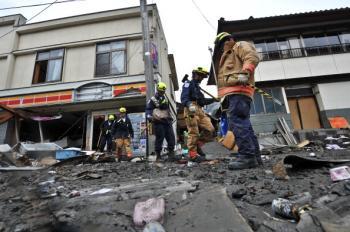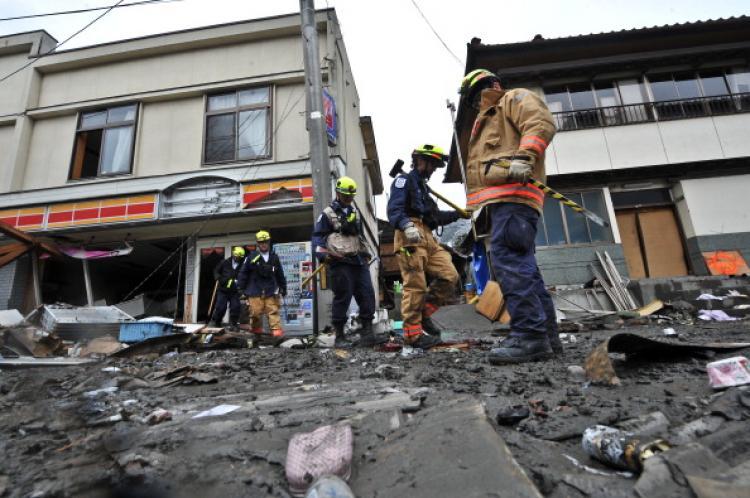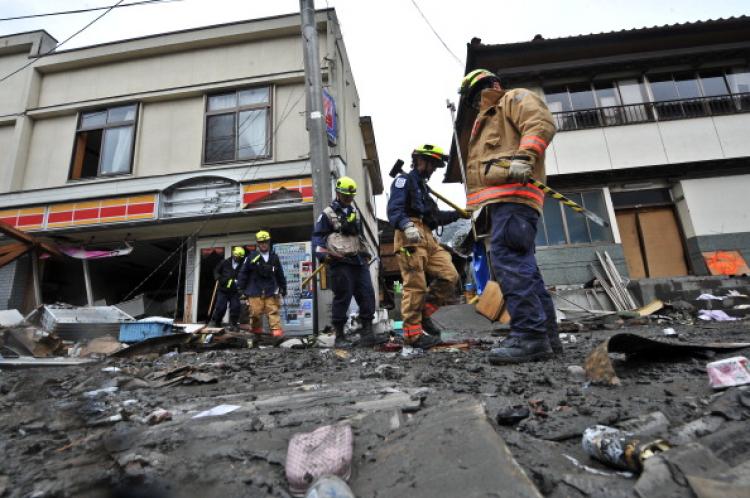As Japan’s nuclear crisis escalates with four explosions and two fires at the Fukushima Daiichi nuclear power plant, foreigners have started a gradual exodus from the earthquake-devastated nation.
The British Foreign and Commonwealth Office is advising against all nonessential travel to Tokyo and northeastern Japan and has asked British nationals in the hard-hit areas to “consider leaving” given the damage from the earthquake, aftershocks, and tsunami.
“Due to the evolving situation at the Fukushima nuclear facility and potential disruptions to the supply of goods, transport, communications, power, and other infrastructure, British nationals currently in Tokyo and to the north of Tokyo should consider leaving the area,” said a statement from the office on Thursday.
The British Embassy in Japan on Thursday launched a free coach service from Sendai, Miyagi Prefecture to Tokyo to evacuate British nationals. Sendai is located 81 miles west of the epicenter of the magnitude 9.0 earthquake that struck off Japan’s east coast on Friday, March 11.
The United States, which is assisting Japan extensively in its relief efforts, has not explicitly asked nationals to leave the hard-hit areas, but instead issued a recommendation on Thursday morning that asks American citizens living within 50 miles of the Fukushima plant to “evacuate the area or to take shelter indoors if safe evacuation is not practical.”
The U.S. Embassy has warned of radioactive contamination within the 50-mile radius and possible low-level radioactive materials existing in farther areas. The U.K. and Australia have also advised their citizens to stay out of the 50-mile radius.
Earlier on Sunday, the embassy asked U.S. citizens to avoid traveling to Japan at this time due to the likelihood of further aftershocks, tsunamis, and nuclear crisis. It also encouraged Americans in Japan to contact their family members using text message or social media when power or telephone services are disrupted.
Aside from the United States and the U.K., several other governments, including France, China, and Australia have advised their citizens to leave or take measures to evacuate them from Tokyo and quake-hit areas.
The Australian government has authorized the voluntary departure of Australian officials in Tokyo. It has also asked its citizens to consider leaving the capital and affected areas.
“Because of continuing disruptions to transport, communications, power, and other infrastructure, school closures and continuing aftershocks, Australians in Tokyo and affected prefectures, who do not have a need to be there, should consider departure,” read the travel advisory on Thursday.
As of Thursday morning, the National Police Agency has confirmed the death of at least 5,178 people. The number of those missing has gone up to 8,606.
The British Foreign and Commonwealth Office is advising against all nonessential travel to Tokyo and northeastern Japan and has asked British nationals in the hard-hit areas to “consider leaving” given the damage from the earthquake, aftershocks, and tsunami.
“Due to the evolving situation at the Fukushima nuclear facility and potential disruptions to the supply of goods, transport, communications, power, and other infrastructure, British nationals currently in Tokyo and to the north of Tokyo should consider leaving the area,” said a statement from the office on Thursday.
The British Embassy in Japan on Thursday launched a free coach service from Sendai, Miyagi Prefecture to Tokyo to evacuate British nationals. Sendai is located 81 miles west of the epicenter of the magnitude 9.0 earthquake that struck off Japan’s east coast on Friday, March 11.
The United States, which is assisting Japan extensively in its relief efforts, has not explicitly asked nationals to leave the hard-hit areas, but instead issued a recommendation on Thursday morning that asks American citizens living within 50 miles of the Fukushima plant to “evacuate the area or to take shelter indoors if safe evacuation is not practical.”
The U.S. Embassy has warned of radioactive contamination within the 50-mile radius and possible low-level radioactive materials existing in farther areas. The U.K. and Australia have also advised their citizens to stay out of the 50-mile radius.
Earlier on Sunday, the embassy asked U.S. citizens to avoid traveling to Japan at this time due to the likelihood of further aftershocks, tsunamis, and nuclear crisis. It also encouraged Americans in Japan to contact their family members using text message or social media when power or telephone services are disrupted.
Aside from the United States and the U.K., several other governments, including France, China, and Australia have advised their citizens to leave or take measures to evacuate them from Tokyo and quake-hit areas.
The Australian government has authorized the voluntary departure of Australian officials in Tokyo. It has also asked its citizens to consider leaving the capital and affected areas.
“Because of continuing disruptions to transport, communications, power, and other infrastructure, school closures and continuing aftershocks, Australians in Tokyo and affected prefectures, who do not have a need to be there, should consider departure,” read the travel advisory on Thursday.
As of Thursday morning, the National Police Agency has confirmed the death of at least 5,178 people. The number of those missing has gone up to 8,606.






